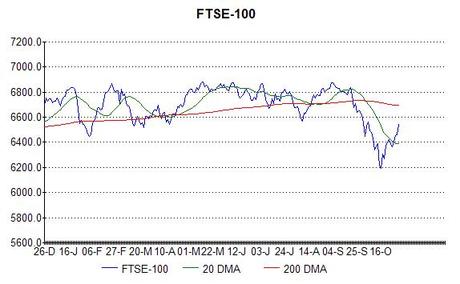Home > Lunacy, Quantitative Easing, Stock Market > Fed. ends QE; BoJ takes up baton!
Fed. ends QE; BoJ takes up baton!

As we seem to have negotiated the end of QE relatively painlessly, I don't see any reason why the markets should not continue to rise from here and I wouldn't be surprised to see the Dow at 30,000 and the FTSE at 12,000 within a couple of years. This would be the final, blow-off, phase of the bull market before the whole debt-fuelled edifice comes crashing down. At the moment it is difficult to see what might drive a surge of this magnitude, but one possibility is money moving from the bond markets to equities. The bond market is much larger than the equity market and has been on a long term bull run for over thirty years, which has pushed down yields in the UK and US to below 2.5%. If a proportion of the money invested in government bonds were to switch to equities in anticipation of the end of that run, or in search of higher yields, this could push share prices up significantly. Once the end of the bull market in bonds becomes apparent though, this will cause problems for most Western governments. If prices start to fall, yields will rise and it will cost those governments more to service their (very large) debt as they roll it over when existing bonds mature. It is like an individual with a maxed out credit card finding that the issuer is putting the interest rate up. Currently, governments are reliant on low interest rates to keep their deficits down; if rates go up they will have less money for public spending and need to borrow more in order to avoid unpopular cuts. This means they could become less creditworthy and their interest rates go up further, causing the whole Western world to spiral into bankruptcy.
